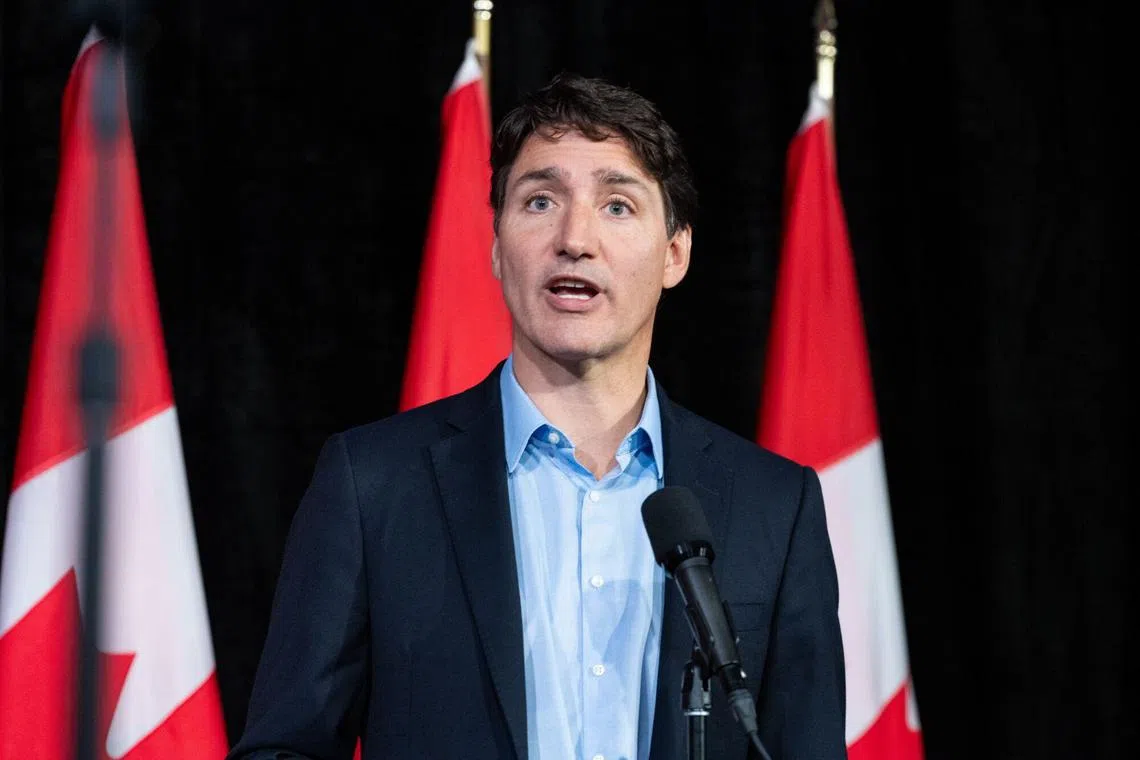Canada to hit China with tariffs on electric vehicles and steel
Sign up now: Get ST's newsletters delivered to your inbox

Prime Minister Justin Trudeau announced that Canada will impose new tariffs on Chinese-made electric vehicles, aluminium and steel.
PHOTO: BLOOMBERG
Follow topic:
OTTAWA - Canada will impose new tariffs on Chinese-made electric vehicles (EVs), aluminium and steel, lining up behind Western allies and taking steps to protect domestic manufacturers.
The government announced a 100 per cent levy on EVs and 25 per cent on steel and aluminium.
The surtax on electric vehicles will take effect on Oct 1 and will also include certain hybrid passenger automobiles, trucks, buses and delivery vans. It will be added to an existing 6.1 per cent tariff that applies to Chinese EVs.
The levies on aluminium and steel will take effect on Oct 15.
Canadian Prime Minister Justin Trudeau’s government is also launching a new 30-day consultation on other sectors, including batteries and battery parts, semiconductors, solar products and critical minerals.
“We are transforming Canada’s automotive sector to be a global leader in building the vehicles of tomorrow,” Mr Trudeau told reporters in Halifax, Nova Scotia.
“But actors like China have chosen to give themselves an unfair advantage in the global marketplace, compromising the security of our critical industries and displacing dedicated Canadian autos and metal workers.”
Canada, an export-driven economy that relies heavily on trade with the United States, has been closely watching moves by the Biden administration to erect a much higher tariff wall against Chinese EVs, batteries, solar cells, steel and other products.
Canada’s auto sector is highly integrated with that of its closest neighbour. The vast majority of its light vehicle production – which was 1.5 million units in 2023 – is exported to the US.
The government also announced it will limit eligibility for EV incentives to products made in countries that have negotiated free-trade agreements with Canada.
It will review the new levies within a year of them coming into effect.
China’s embassy in Ottawa said the move was a “typical act of trade protectionism and political domination” in defiance of World Trade Organisation rules and inconsistent with Canada’s position as a self-proclaimed advocate of global free trade and climate action.
Canada’s accusation of “overcapacity” is groundless, it said in a statement, arguing that China’s rapid development of EVs relies on technological innovation, sound production and sufficient market competition. “China will take all necessary measures to safeguard the legitimate rights and interests of Chinese enterprises,” the embassy said.
China has retaliated against Canada before. It previously restricted imports of Canadian canola seed for three years – a move seen as retribution for a decision by the Canadian authorities to arrest Huawei executive Meng Wanzhou in Vancouver on a US extradition warrant. Ms Meng returned to China in 2021.
The European Union has also announced proposed new tariffs on electric vehicles imported from China, though at lower levels than what the US and now Canada are proposing.
Chinese leaders plan to raise the issue of tariffs when US National Security Adviser Jake Sullivan visits this week, according to the official Xinhua news agency. Mr Sullivan is due to meet Foreign Minister Wang Yi and may also meet Chinese leader Xi Jinping.
The value of Chinese electric vehicles imported by Canada surged to C$2.2 billion (S$2.1 billion) in 2023, from less than C$100 million in 2022, according to data from Statistics Canada. The number of cars arriving from China at the port of Vancouver jumped after Tesla started shipping Model Y vehicles there from its Shanghai factory.
But the Canadian government’s main concern is not Tesla, but the prospect of cheap cars made by Chinese automakers eventually becoming available.
BYD informed the Canadian government in July that it intends to lobby lawmakers and officials about its plans to enter the country.
Mr Trudeau also faced political and industry pressure to protect domestic jobs and wages. The government has bet big on automakers and manufacturers from democratic allies.
It has agreed to multibillion-dollar subsidies for EV plants or battery factories for Stellantis, Volkswagen and Honda Motor, among others.
With an upcoming review of the US-Mexico-Canada Agreement in 2026, there is “simply too much at stake” for the auto industry and economy if Canada is misaligned with the US, Mr Brian Kingston, president and chief executive officer of the Canadian Vehicle Manufacturers’ Association, said in a statement.
Steel and aluminium producers in Canada have also publicly and repeatedly urged the government to restrict China’s access.
Ms Catherine Cobden, president and chief executive of the Canadian Steel Producers Association, said the move will not create major supply chain challenges.
“Of course there will be adjustments that will have to take place, but we’re confident there’s enough steel to meet the needs of Canadian and American consumers without unfairly traded, highly subsidised Chinese steel,” she said in an interview. BLOOMBERG

